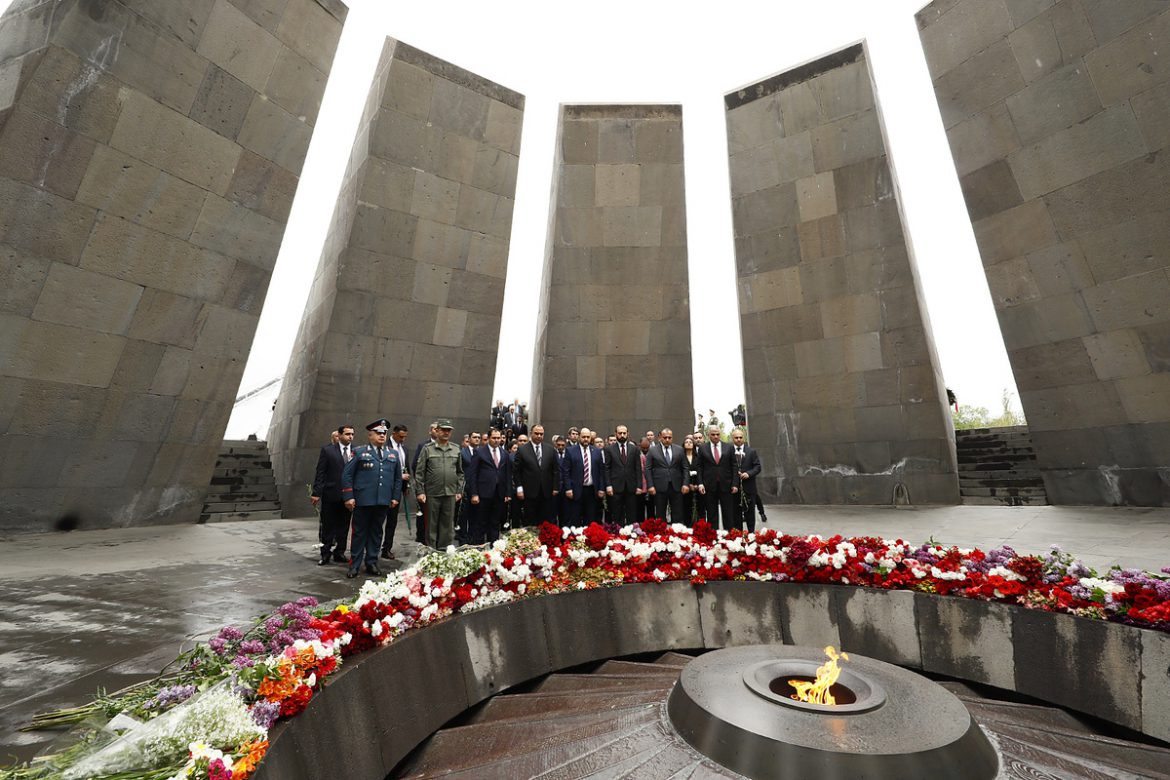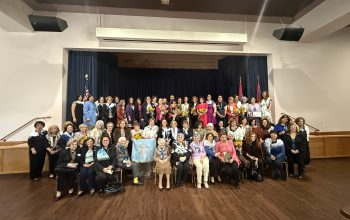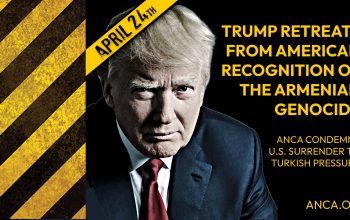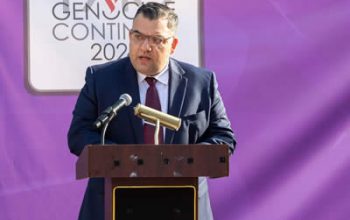YEREVAN—Recent discourse surrounding the Armenian Genocide has sparked controversy in Armenia. Prime Minister Nikol Pashinyan’s April 16 lecture at the School of Democracy of KP has been a catalyst for the opening of what some dub as an Overton window for denying, questioning and rejecting the historic event. Pashinyan’s lecture, titled “Socio-psychology of the Republic of Armenia,” refrained from using the terms “genocide” or “Mets Yeghern,” focusing instead on the geopolitical intricacies of the issue.
Opposition circles increasingly believe that Turkey is conditioning the signing of a peace treaty with Azerbaijan on Armenia renouncing its pursuit of genocide recognition. During his April 16 speech, Pashinyan argued that Russia has exacerbated genocide claims since 1946, suggesting that the return of emigrants to Armenia by the Russian Federation intensified demands for acknowledgment.
Following Pashinyan’s lecture, Civil Contract MP Andranik Kocharyan advocated for a comprehensive list of victims to be established, challenging the widely accepted casualty figure of 1.5 million Armenians. Armenian opposition figures and scholars have argued that Kocharyan is openly questioning the fact of the genocide.
In response to criticism, Kocharyan later told reporters that the proposal reflects his personal stance and not a political decision by Pashinyan’s administration.
Pashinyan’s actions may pave the way for a message on the 109th anniversary of the Genocide. With the approach of April 24, Kocharyan’s remarks have ignited debate over the accuracy of historical accounts. Critics argue that this initiative risks downplaying the gravity of the genocide and capitulating to Turkish demands.
Genocide expert Suren Manukyan cautioned against the government’s stance, noting Turkey’s historical efforts to discredit the genocide’s scale and the impracticality of compiling comprehensive victim records given the Ottoman Empire’s lack of documentation on ethnic minorities.
Manukyan emphasized that the essence of genocide lies not in numerical figures but in the deliberate intent to annihilate a group, citing the Bosnian genocide as a parallel example where the significance of numbers pales in comparison to the orchestrated mass killings.
The government’s pivot on the genocide issue has prompted accusations of capitulation to Turkish influence from opposition figures like Eduard Sharmazanov, who accuse Pashinyan of sidelining Armenian Genocide remembrance in deference to Turkey’s interests. Sharmazanov said Pashinyan’s administration is “following orders” from Turkey to “consign the Armenian Genocide to history.”
In an interview with Tert.am, Murad Papazian, a member of the ARF Bureau and co-chairman of the Coordinating Council of Armenian Organizations of France, expressed concern over recent statements made by Armenian officials regarding the Armenian Genocide.
Papazian reacted to Kocharyan’s suggestion, arguing that such remarks reflect a dangerous trend of questioning the reality of the Genocide, echoing past proposals by Turkey to form a commission of historians to reassess the events of 1915.
Highlighting the widespread recognition of the Armenian Genocide by 30 countries and scholarly work, Papazian denounced the Armenian government’s apparent shift in policy. He accused PM Pashinyan of capitulating to the interests of Armenia’s enemies, from conceding territory to questioning the Genocide.
Questioning the rationale behind compiling a list of victims, Papazian likened the proposal to something Turkey would suggest, urging Armenians to reject any attempts to rewrite history.
Papazian criticized Pashinyan’s administration for its disregard of national values, accusing it of neglecting the fight for the recognition of the Genocide and the return of Artsakh, as well as failing to recognize the importance of the Diaspora.
Regarding Kocharyan’s subsequent statement distancing the issue from political decision-making, Papazian dismissed it as a strategic maneuver by the government to gauge public reaction.
The recent controversy regarding genocide denial follows another effort by the Pashinyan administration to polarize the public. In a recent address to the National Assembly, Pashinyan stirred debate when he suggested a fundamental dissonance between historical Armenia and the present-day nation. Pashinyan’s remarks have drawn criticism for their perceived departure from conventional understanding of national identity.
During his speech, Pashinyan posited that historical Armenia and contemporary Armenia are not only incompatible but often diametrically opposed, posing potential threats to each other. This assertion, along with previous statements from the Prime Minister questioning the relationship between national and state interests, has raised eyebrows among political observers. In Pashinyan’s view, “national interests” are in conflict with the broader concept of the “people’s interest,” a dichotomy that some see as contrived and potentially divisive.
Detractors have highlighted the essential role of historical narrative in shaping national identity. By framing historical Armenia as antithetical to contemporary realities, Pashinyan has sparked concerns over the erasure of cultural heritage and collective memory. Critics argue that such rhetoric risks undermining the cohesive fabric of Armenian society. Moreover, Pashinyan’s emphasis on a redefined national identity has prompted questions about the inclusion of ethnic minorities within Armenia’s social and political landscape.
In another point of national controversy regarding the government’s policies, PM Pashinyan made an impromptu visit to the Tavush region on April 17. During this visit, he convened meetings with residents from Voskepar, Kirants and Berkaber. Attendees were required to surrender all cameras and mobile devices under the supervision of Pashinyan’s security personnel.
According to local political scientist Suren Petrosyan, Pashinyan departed abruptly without addressing the concerns of residents. Petrosyan said that the prime minister showed disregard towards the citizens of Voskepar.
“In the meeting, residents were denied the opportunity to pose questions to Pashinyan, who swiftly exited the scene,” Petrosyan remarked during a Facebook live session, showcasing a participant who was unable to engage with Pashinyan.
“They kept him at a distance of several tens of meters, ensuring no questions or interactions could occur. It was as if they fled,” added the political scientist.
According to Petrosyan, Pashinyan is in 90-percent alignment with Aliyev regarding the status quo. Negotiations are underway to maintain Armenian control over a key road that passes through the region. Villagers opposed the idea of constructing an alternative route, fearing it would prompt swift concessions.
The civil movement “Tavush for the Motherland” released a statement denouncing the unexpected visit. The statement argued that discussing crucial issues regarding the fate of the Armenian nation in a closed format is inherently misleading. It emphasized that the matter at hand extends beyond the concerns of individual villages like Voskepar, Baghanis and Kirants, and decisions to cede strategic territories affect the entire Armenian populace.
The movement upheld that border demarcation issues cannot solely rely on the consent or dissent of residents from a few Tavush villages. They argue that placing the responsibility solely on the shoulders of villagers diverts accountability from the state leadership and burdens citizens with the weight of determining the nation’s territorial integrity.
Furthermore, the movement cautioned against exacerbating social divisions among villagers by imposing the decision-making process solely on them. They warned that such an approach could breed internal discord and animosity within Tavush communities, jeopardizing the solidarity they have maintained through various challenges.
The statement condemned the ruling authorities’ actions, asserting that border demarcation issues must be addressed in accordance with established legal procedures and international agreements.
They stressed that any alternative proposals or decisions made without adherence to legal frameworks are illegitimate and potentially criminal acts against the state.
The movement reaffirmed that surrendering sovereign territories of the Republic of Armenia and making unilateral decisions without proper authority constitute grave offenses against the nation’s sovereignty and security.




